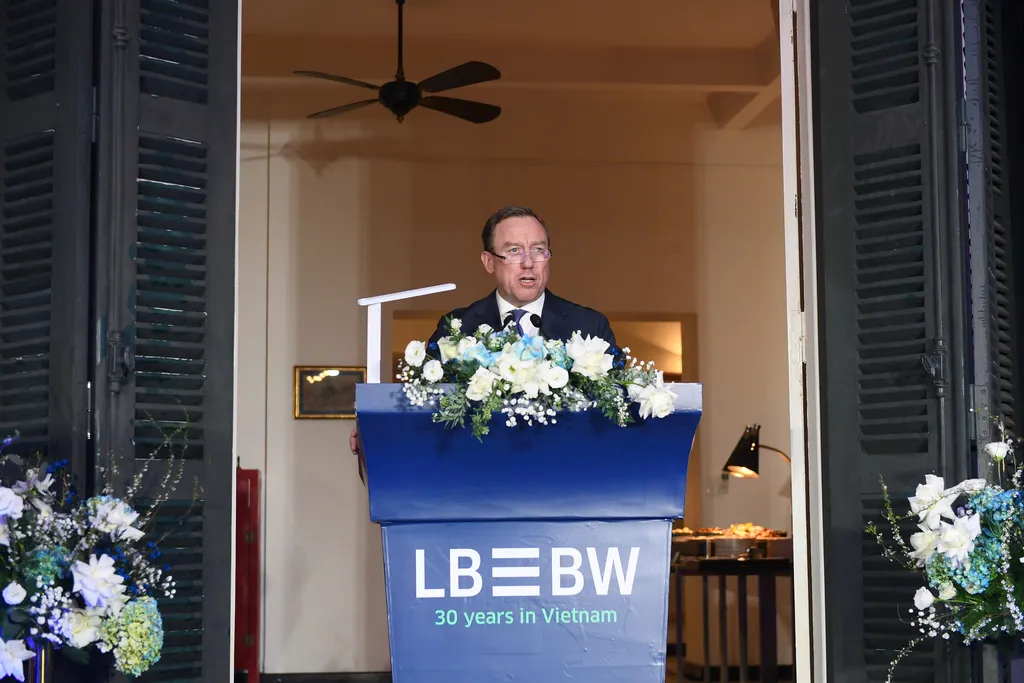 Politics & Law
Politics & Law

 |
| Mr. Ruebbert delivered a speech at the 30th anniversary of LBBW in Việt Nam |
HÀ NỘI – Việt Nam possesses many favourable factors to develop a dynamic and strong economy, said Mr. Jens Ruebbert, Chairman of the EU-ASEAN Business Council.
In a recent interview with reporters from the Vietnam News Agency, Mr. Ruebbert, who is also President of the European Chamber of Commerce in Singapore and Managing Director for the Asia-Pacific region of Landesbank Baden-Württemberg (LBBW), emphasised that in terms of opportunities, Việt Nam has a lot to offer as a very dynamic and fast-growing economy. The Vietnamese government has always been open and friendly to investment and has implemented many reforms to integrate into global trade. Additionally, the country's young and eager-to-learn population is a strength.
“The most potential areas of economic cooperation are in trade, and luckily, we are talking about free trade, as manifested by the EU-Việt Nam Free Trade Agreement (EVFTA),” he stated, adding that in terms of sectors and investment, green energy/green technology, high-tech & Industry 4.0, med-tech & biotech, as well as mobility & transportation.
Regarding current initiatives, he highly appreciated the following three points. The first is the excellent economic prospects in Việt Nam, with an ambitious 8% GDP growth target for 2025. The second is the most significant governance restructuring since Đổi Mới, which the National Assembly finalised in February. This will mark the beginning of a new economic ambition. Finally, Resolution No. 57-NQ/TW, dated 22 December 2024, by the Politburo on breakthroughs in science, technology, innovation, and national digital transformation, identifies science, technology, and innovation as the driving force for Việt Nam's further economic development.
Assessing the impact of Việt Nam's tax and customs reforms on the business environment and the development of European companies in Việt Nam, Mr. Ruebbert stated that over the years, Việt Nam has implemented many major tax and customs reforms to improve the business environment, attract foreign investment, and integrate more deeply into the global economy. These reforms are particularly important for European businesses operating in Việt Nam.
“Việt Nam's tax and customs reforms currently focus on simplifying procedures, increasing transparency, and aligning with international standards. Key reforms include streamlining customs procedures, such as reducing time and complexity in customs processes, implementing national and ASEAN single windows, helping businesses submit documents electronically, and minimising procedures.”
In addition, the expert said that since 2021, the General Department of Customs (GDC) has implemented a programme to support businesses in voluntarily complying with customs laws, helping to reduce costs and customs clearance times.
At the same time, it is modernising tax management by implementing e-invoices and electronic tax declaration and payment systems, reducing the bureaucratic burden on businesses. As committed in free trade agreements such as the EVFTA, Việt Nam has reduced tariffs on many products, benefiting European businesses.
He stressed that all of the above reforms have had a positive impact on Việt Nam's business environment. Accordingly, the simplification of customs procedures and electronic systems helps reduce transaction costs and time, especially for businesses that depend on fast supply chains.
Lower tariffs and simpler processes make Việt Nam an attractive destination for European businesses looking to expand production or invest, increasing competitiveness. In particular, improved transparency and compliance with international standards have increased Việt Nam’s attractiveness for foreign direct investment (FDI).
Mr. Ruebbert highlighted that European businesses have welcomed these reforms in Việt Nam as they have brought many benefits, such as facilitating trade and increasing the volume of exchanges between Việt Nam and the EU; reducing transaction costs through electronic filing and payments; and improving business predictability, which is important for long-term planning and investment.
However, the expert believed that challenges remain, such as the inconsistent implementation of reforms due to differences in administrative capacity at the local level. The regulatory environment in Việt Nam still needs to be streamlined and clarified. With increasing trade volumes, Việt Nam’s infrastructure, including ports and logistics networks, needs to be further upgraded to meet the demand.
Talking about the EU-ASEAN Business Council’s contributions to connecting Vietnamese companies and government agencies with European countries, Mr. Ruebbert said: “Personally, I think that the EU-ASEAN Business Council, which works very closely with EuroCham in Việt Nam, has connected European companies with Vietnamese government agencies at a deep level. We conduct mission trips every year, bringing large business delegations from Europe to Việt Nam to work directly with ministries and discuss urgent issues in many fields. Last year, we organised a mission trip with more than 120 delegates from over 50 companies, meeting with Vietnamese ministries.”
Regarding LBBW’s operations in Việt Nam, Mr. Ruebbert shared that Việt Nam and Singapore were the countries where we took our first steps in the Asia-Pacific region, and to this day, Việt Nam remains a key focus for the bank. Looking back, LBBW takes particular pride in its role in Việt Nam's transition to a greener, cleaner energy landscape.
In recent times, LBBW participated in financing the first-ever LNG-to-power project in Việt Nam. This groundbreaking deal marked a significant step towards energy diversification and sustainability. It also contributed to about 10% of the total number of wind power projects in Việt Nam, promoting renewable energy.
In addition, LBBW has pioneered the development of ECA-covered loan structures in Việt Nam, making it easier for European companies to export equipment to Việt Nam. It has also provided consulting services in M&A transactions, especially in the renewable energy sector, helping to bridge cultural gaps and facilitate sustainable cooperation.
Over the past 30 years of operation, the bank has remained involved in facilitating connections between Vietnamese companies and German and European companies, while providing banking services tailored to the needs of companies in Việt Nam. – VNS